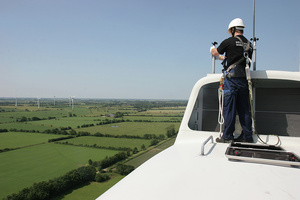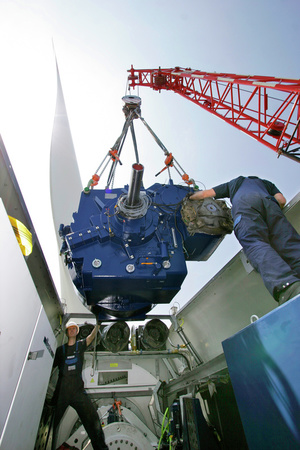News Release from Windmesse.de
Wind Industry Profile of
Deutsche Windtechnik further expands their operations
Windfair: Deutsche Windtechnik provides an extensive portfolio for the wind energy sector. Would you please describe the services you offer?
Matthias Brandt: Deutsche Windtechnik is the largest independent wind energy service company with a head office in Germany. We provide all kinds of services linked with wind energy systems and plants. Our service portfolio includes machine and rotor blade services, tower and foundation work, substation services, offshore and consultancy services as well as repowering solutions. In addition we also operate an internal unit for control and power electronics with trading of spare parts worldwide. Within the scope of fixed service contracts, we now service more than 2,200 systems across Europe. Our service network comprises 60 locations in Germany, Poland, Spain and Denmark.
How many systems/wind farms do you provide services and support for on the German market? Are there regional focal areas?
We support more than 1,600 systems on the German market with over 2,000 MW. More than 50 regional service stations distributed around the country provide ideal vicinity to both systems and clients. Our focus is determined by the respective location of wind turbines. Where there’s wind energy, we provide services. We also have service contracts with and provide support for 56 substations.
Your company also covers the field of offshore wind energy. What challenges does this sector involve?
Offshore energy differs from onshore wind energy not so much in terms of system technology but in terms of accessibility, technical expenditure and the respective infrastructure required. We can see there is still no long-term, reliable concept for regulated service operations and are doing all we can to find a solution to this problem. We currently have a contract with the offshore substation and the transition pieces of the Butendiek Wind Farm. We had to reorganize and revise quite a few issues in this context, since there was insufficient empirical data available on the German market. We have meanwhile developed extremely convincing strategies in the fields of packaging of services, logistics and predictive maintenance planning and have successfully implemented such strategies.
Cost reduction is a ubiquitous topic in the offshore sector. Where do you see potential in the field of services and maintenance?
We can see savings potential in the fields of bundling services and operations planning, especially with regard to logistics and processes. Not every service provider has to set up their own structures. Cooperation beyond wind farms can be a key to reducing costs. We think there is enormous potential here to optimize and utilize synergies.

You offer independent services and maintenance. What does that mean in terms of the work involved? Do you have respective experts among your staff for specific system typs or manufacturers or are all of your staff allrounders who are able to handle every system?
In the field of machine services we have focused on two system typs: Vestas and Siemens as well as predecessors incorporated by these companies such as NEG Micon and AN Bonus. Concentrating on two technologies means we are just as good in service work, if not better, than the manufacturer. Whether we work with specialists or allrounders on a system depends on the respective order and project. In second-level support, however, we work only with specialists, system-dependently.
Deutsche Windtechnik recently took over two Spanish companies and has announced it plans further expansion abroad. Has the German market become too small for you?
No, Germany is still our core market, which is reflected in the number of systems and service stations. We are also continuously gaining new customers in Germany, too. However, in our neighboring countries we can identify a similar situation to what formerly led to the foundation of Deutsche Windtechnik and other independent service companies: a strong demand for independent expertise. We believe that we can also be successful in other countries on account of our technical competence and know-how. Of course, you always have to consider local cultural and structural features, but the technology is the same and in the end top quality services will always assert itself.

Where does your company operate from? And could you please explain the situation regarding coordination with your external locations?
We have onshore service stations in Germany, Poland and Spain and offshore services in Denmark. However, we complete contracts and service orders in many other European countries and across the world. We more or less cover all continents especially in the field of spare parts trade and repowering.
Coordination is ensured in different ways. Either relatively automatically by means of internal structures as practiced in Spain or centrally via our service center in Ostenfeld, Schleswig-Holstein/Germany, which is how we handle our Polish contract systems. Both approaches are effective and are based respectively on the existing market circumstances. There are always some sections which can be well organized on a centralized basis, for example remote data monitoring. In contrast, it may be more beneficial to locate materials planning, for example, in the respective target country.
In recent months discussion in the German wind energy sector has been dominated by the reform of the EEG (Renewable Energy Law). Are you satisfied with the result of this reform?
Well, we can certainly live with this reform since our business is currently not as dependent on the overall economy as is the case, for example, for manufacturers or project planning companies. However, in the long term we will also be affected. Whether invitations to tender are the right approach will have to be seen. There is of course a risk that this may result in extreme cost pressure at the expense of quality. This may then be reflected in a shifting away from European top quality which is something we would of course not approve of as a service provider for Siemens and Vestas systems. What disturbs us most is that an EEG reform is today considered as a base for the change to alternative energy resources. The focus on the renewable energy sector is too strong. We expect and hope for a genuine, coherent energy policy which includes all energy sources and not a mere patchwork restructuring of the EEG.
Could you tell us something about upcoming projects or new services/products which Deutsche Windtechnik will be introducing in the near future?
We want to continue our growth in the full-service sector in 2015. Our concept is becoming more and more popular among institutional investors, banks and insurance companies. In addition, we will be looking closely at the European market to find further growth potential. We are currently setting up a company in Great Britain, since we consider this market to be very interesting. And, of course, there is also plenty of potential in the offshore market.
We will also be focusing on the development of upgrades and improvements. As a result of our intensive work with respective engineering we are fully aware of the weaknesses which need to be rectified and will implement such action in a reengineering process.
Picture Copyright: Deutsche Windtechnik
- Source:
- Deutsche Windtechnik
- Author:
- Katrin Radtke
- Email:
- press@windfair.net
- Link:
- www.deutsche-windtechnik.de/...
